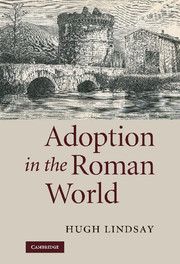Book contents
- Frontmatter
- Contents
- List of figures
- Preface
- List of abbreviations
- Introduction
- 1 Adoption, kinship and the family: cross-cultural perspectives
- 2 Kinship in Greece and Rome
- 3 Greek adoptions: comparisons and possible influences on the Roman world
- 4 Procedural aspects of Roman adoption
- 5 The testamentary adoption
- 6 Roman nomenclature after adoption
- 7 Adoption and inheritance
- 8 Roman freedmen and their families: the use of adoption
- 9 Adoption in Plautus and Terence
- 10 Sallust and the adoption of Jugurtha
- 11 Adrogatio and adoptio from Republic to Empire
- 12 Testamentary adoptions – a review of some known cases
- 13 Political adoptions in the Republic
- 14 Clodius and his adoption
- 15 The adoption of Octavian
- 16 Political adoption in the early Empire at Rome, Pompeii and Ostia; the imperial family
- Conclusion
- Glossary
- References
- Index
Conclusion
Published online by Cambridge University Press: 25 January 2010
- Frontmatter
- Contents
- List of figures
- Preface
- List of abbreviations
- Introduction
- 1 Adoption, kinship and the family: cross-cultural perspectives
- 2 Kinship in Greece and Rome
- 3 Greek adoptions: comparisons and possible influences on the Roman world
- 4 Procedural aspects of Roman adoption
- 5 The testamentary adoption
- 6 Roman nomenclature after adoption
- 7 Adoption and inheritance
- 8 Roman freedmen and their families: the use of adoption
- 9 Adoption in Plautus and Terence
- 10 Sallust and the adoption of Jugurtha
- 11 Adrogatio and adoptio from Republic to Empire
- 12 Testamentary adoptions – a review of some known cases
- 13 Political adoptions in the Republic
- 14 Clodius and his adoption
- 15 The adoption of Octavian
- 16 Political adoption in the early Empire at Rome, Pompeii and Ostia; the imperial family
- Conclusion
- Glossary
- References
- Index
Summary
The introduction of outsiders is used in many historical communities as a strategy for succession, and adoption proves to be a versatile method of accomplishing this. The first section of this book surveys the range of uses to which adoption can be adapted, which includes finding homes for children from impaired families, providing childless couples with a family life, as well as providing descendants and heirs to property. Adoption has also been used to make individuals eligible to inherit real property or social position from which they would otherwise have been excluded because of inalienability in the case of property or status in the case of position. The creation of fictitious proximate relationships satisfies social demands for stability and conservatism in cases of this sort. Not all the communities surveyed encouraged the adoption of complete strangers for these purposes, and in some cases the choices taken simply promote close relatives in the pecking order. Contemporary concerns have until recently ensured that adoption in the modern Western world was largely concerned with providing homes for disadvantaged children, while at the same time providing a family life for childless couples. Something closer to the ancient world has developed more recently in same-sex adoptions, which have been instituted to enable the parties to ensure the transfer of property rights to their partners.
The question of the role of kinship in Greece and Rome is important in relation to adoption.
- Type
- Chapter
- Information
- Adoption in the Roman World , pp. 217 - 220Publisher: Cambridge University PressPrint publication year: 2009



